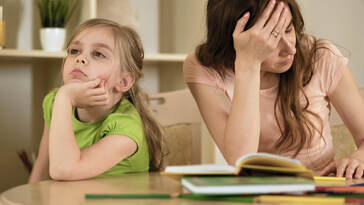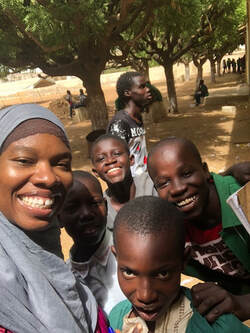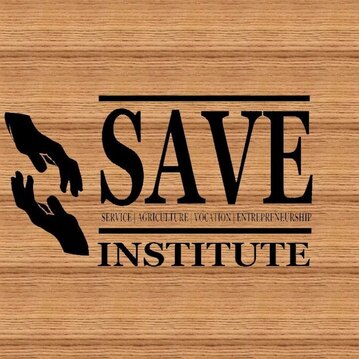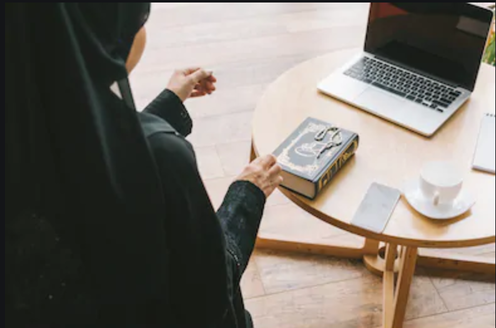 Who would ever imagine we would have gotten to this point: online learning for every student in the United States of America. As an educator for 17 years, I must say this is one of the most difficult times I’ve experienced. According to a NewsWeek article, a group of NWEA researchers came up with two possible scenarios when discussing the effect of the pandemic, “… data to project growth trajectories for the students under two scenarios: a "melt," in which students basically gained no ground during the school closures; and a "slide," in which students lost ground academically during the closures at rates similar to those seen over the long summer break.” (Sparks, 2020). This might sound discouraging to some parents; however, it also should not deter them from trying to lessen any negative effect a prolonged closing might have on their children returning to school in the fall, Inshallah (God willing). Being an educator, I expect for some of my students to have a summer slide due to a number of different reasons: traveling, lack of supervision, parents’ jobs, mental break, etc. I used to suggest various activities to parents that students can complete during their summer break:
Taking this model into account, we can plan to continue learning during the summer time to ensure that our children do not have a huge summer slide once we return in the fall. Some ideas to continue learning are:
Dr. Khaleeqa Bruce Ed DMy name is Dr. Gloria Bruce. I have been in education for 17 years, with the last five years as an Assistant Principal at Al-Falah Academy. I am a firm believer that learning is a continuous journey and I am always looking in areas I can improve my craft.
0 Comments
 By Sakeena Abdul-Hakeem The kids call me “aunty.” What else are they expected to call a nearly 40 year old American lady who suddenly shows up in their third grade classroom? After living in Senegal, West Africa for two years, looking for educational opportunities for adults, I was dissatisfied with the options. My understanding of Wolof was too rudimentary to attend lectures by the resident scholars. And my Arabic knowledge had too many holes in its foundation to be useful. I was attending a one hour Arabic class, four days a week, but the main focus was on memorizing poetry. I struggled through basic Arabic conversation, but could parrot lines of ancient prose. I was no closer to my goal of understanding the language of the Quran than when I’d first arrived in Africa. That’s when the director of a local private school invited me to attend the El Hajj Abdullahi Niass Institute. I’d thought for sure that the local K-12 schools were for children up to age 18, just as they are in the a United States. Boy was I wrong. Have you ever thought about going back to school? What did that look like for you? Perhaps you can enroll in night classes or weekend courses at your local college. Maybe you’re looking to achieve a financial goal that earning another degree or a certificate will ensure. Not for me. I was going all the way back. Back to primary school. After an initial assessment, which I didn’t realize I was taking until half way through, I was placed in 3rd grade. I thought I was just having a polite conversation with the principal. In Arabic, he asked me my name and where I was from. He asked if I could recite a Hadith, a surah from the Quran, and if I knew the difference between verbs and nouns. He scribbled a quick note and directed my young translator to show me the 3rd grade classroom. I thought perhaps I’d peek in, greet the teacher and make arrangements to start attending class the following week. Nope! The teacher rearranged the rows of girls and squeezed me onto a narrow bench besides two of them. This was to be my first day of class. As I sat in the classroom, I noticed some major differences between our American educational system and theirs. Instead of colorful posters pasted to the walls, they were bare. All attention was focused on the huge blackboard in the front of the room. There were about 80 students to one teacher. And some of these kids didn’t look like 8 year olds- what I would consider to be a 3rd grader. In fact, a man sitting two rows over from me had a speckled beard! What could I learn in 3rd grade in Africa? I really had to humble my nearly 40 year old ego to learn from Muhammad, which I would discover was the name of almost every teacher in the entire school. We baked in the hot classrooms without so much as a fan, but no one complained. The students stood at silent attention whenever the teacher, or a visiting guest, would enter the classroom. If the teacher was in class before them, the students stood at the door of the classroom waiting for permission to enter. They ooh’d and aah’d in appreciation whenever a fellow classmates was called upon to recite a lesson from the Quran. They stood to respond whenever the teacher called on them. The girls took turns sweeping the classroom each morning while the boys cleaned the blackboard and arranged the desks properly. There was a lot more to learn here than just reading and writing. There was a wholistic approach to education. It was more so about respect, good manners, honoring knowledge and it’s teacher- developing a whole person as opposed to just the mind- which seems to be the problem with much of western education. Many of the students had completed the memorization of the entire Holy Quran before enrolling in Arabic school, hence the varied ages of the students. Although, initially it took some getting used to, I really benefited from Arabic school in Senegal. I have a greater appreciation for traditional knowledge and it’s transmission. I believe every person who has the will, should take the opportunity to enjoy learning traditional Islamic knowledge in Africa. The holes in my Arabic foundational knowledge have been filled and I can see great strides in my understanding of Quran. If this is your goal, you too can achieve it, no matter what age. It just takes going back to the basics. All the way back. Sakeena Abdul-HakeemSakeena Abdul-Hakeem is an entrepreneur, sign language interpreter, mother, and published author. For more of her work, check out her blog SakeenainSenegal.wordpress.com and find her novels and short stories on Wattpad.  By Atiba Jones Only 59% of black males graduate public high school in this nation And only 17% go on to earn Bachelor’s Degrees, is the reality of the situation And even blacks with degrees, statistically earn far less than their uneducated white counterparts throughout their career’s duration So it’s no wonder why African-Americans are far more likely to end up on probation And consistently have the highest percentages in prison AKA the new plantation Yes, we’ve come a long way, but I believe there’s still need for a lot more salvation What happens to the other 41% of black males who didn’t complete high school? What happens to the other 83% without a Bachelors to use as a tool? Are they to just be forgotten about as if the problem is merely minuscule? Our educational system has failed them, and no, it’s not cool It’s time for an alternative system that goes beyond the surface It’s time to interrupt their cycles of poverty, crime, incarceration and lack of purpose It’s time for our youth to be exposed to agriculture, vocational trades, entrepreneurship and humanitarian service The art of service has been used for centuries as a tool for character development and spiritual training It instills humility, gratitude and decreases complaining It rids one of arrogance & hypocrisy and leaves nothing but purity remaining It focuses one on benefiting others rather than seeking that which is merely entertaining And the beauty of agriculture is that it reconnects us with nature and our natural state It helps us to understand where the food comes from that ends up on our plate It helps us to experience, through our hands, what God can Create And it allows us to feed our communities healthy foods from what we collectively cultivate Over the past few decades, from high schools we’ve seen vocational education gradually disappear “You have to go to college” is all that we’ve begun to hear And perceptions of inferiority from not having a degree has become a real fear While many tradesman earn far more than the average college graduate per year So why is it made to seem as if the only options are either college or the street? With the only exception being the possibility of becoming a professional athlete Or maybe you can make it by learning how to rap some destructive lyrics to a beat Presenting these as the only options is blatant deceit There is absolutely nothing wrong with going to college, however, it’s not the only way to economically compete And if you don’t have a degree, there’s no need to feel as if you’re somehow incomplete And besides this, entrepreneurs are consistently the wealthiest people on Earth And they create situations for children to inherit enterprises at birth Beyond money, entrepreneurship helps one to discover their true worth It shows you that you can build and lead You can create jobs for those in need But the key is to not fall into the trap of arrogance or greed Because the objective is to save ourselves so that we can save our families and others So that we can uplift our sisters and inspire our brothers Provide hope and support for all the single mothers So this is not just about some economic or material pursuit It’s about radically changing the trajectory of the poor and destitute Providing a new career path for the dope boy and the prostitute Snatching up misguided youth from out of the streets and showing them that there’s a different route And this, my brothers and sisters, has sparked the coming of SAVE Institute Atiba JonesAtiba Jones is the director of the SAVE Institute and former founding director of the Risala Institute. He has been a community activist in the Atlanta area for over 15 years.  By Reshelle Abdul-Malik Social Distancing has caused an unprecedented obstacle for families across the globe. Families are missing Jumuah, daily congregational salah, afterschool, and Sunday school classes. The Islamic community has responded by making a wide variety of courses available from the comfort of your home. Check out our list of some popular online free and paid Islamic Studies courses for the young or seasoned. Al Qalam Institute Offers weekly classes from seerah to tafsir. These classes are completely free. Jannah Institute Offers hifd and tajweed for women and girls Al Huda Online Offer Quran, Hadith, Tazkiyah courses online Al Madrassatu Al Umarriyah Offering free daily Islamic Studies courses. Thought Bubble Online Arabic Courses for children Studio Arabiya Arabic and Quran classes for all ages. Seekers Guidance Online Islamic Seminary that offers free classes. International Open University Started by Dr. Bilal Phillips offers undergraduate and graduate courses on a sliding scale. They are offering diploma courses for free for the next two months. Imam Ghazali Institute Offers free weekend school for children and teens as well as courses for adults. Knowledge College Offer Fiqh, Arabic, Quran, Tajweed, and Hadith courses Islamic Institute of Toronto IIT is offering all of their courses for free for the next 300 days! Check out the wide variety of topics from Aisha RA to Ramadan, to Salah. Faith Essentials FaithEssentials is free for 3 weeks. Register and get immediate access to our 23 modules on fundamental subjects of belief, worship, and daily life. Kiflayn Offers online Islamic studies courses that range from Hadith, Quran, History, and Fiqh. Bayyinah TV Offers over 2000 of hours online of video lessons from Nouman Ali Khan and other Islamic scholars. Ribaat Offers online courses for women by women. Subjects include Islamic Sciences, Arabic, and Quran. Al Maghrib Is offering free courses in response to COVID-19. Some topics include faith essentials, how to protect yourself from disease, and Faith and Fiqh in Uncertain Times. Courses are free for the next three weeks. This list is not exhaustive, please share your resources in the comments section below. Reshelle Abdul-MalikReshelle is the editor of A Message from Makkah. She is also the administrator for Makkah International Institute. Reshelle is a masters degreed educator with with over ten years experience teaching domestically and abroad. |
Don't miss another edition of A Message from Makkah. Click the button below to join our mailing list
Contact Us for Advertising Opportunities!
Archives
January 2023
Categories
All
Our Sponsors |
Makkah International Institute
 RSS Feed
RSS Feed